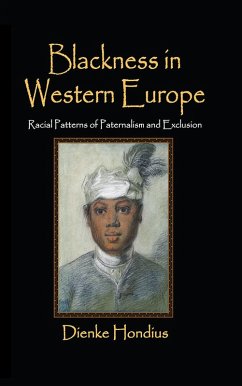European slave-owners, company directors, and investors in the distant past maintained an ocean-wide gap between themselves and the enslaved in the plantation colonies of the Caribbean. In the following centuries, this distance persisted. Even today, to be black in Europe often means to be one of a few black persons in a group. A racial pattern of exclusion has characterized European policy for more than four centuries.
Dienke Hondius identifies ideas and attitudes toward "blackness," the concept of race as visible difference, developed in western Europe. She argues that racial discourses are generally dominated by paternalism-a concept usually used to explain power structures that is often applied to the nineteenth century. Hondius identifies five patterns of paternalism that influenced Europe much earlier and iniated trends of imagery and perception.
Taking a chronological and thematic approach, Hondius first focuses on southern European societies in the Early Modern period and moves to northwest European societies in the Modern period. Addressing religion, law, and science, she concludes with a synthesis of developments from the twentieth century to the present.
Dieser Download kann aus rechtlichen Gründen nur mit Rechnungsadresse in A, B, BG, CY, CZ, D, DK, EW, E, FIN, F, GR, HR, H, IRL, I, LT, L, LR, M, NL, PL, P, R, S, SLO, SK ausgeliefert werden.









